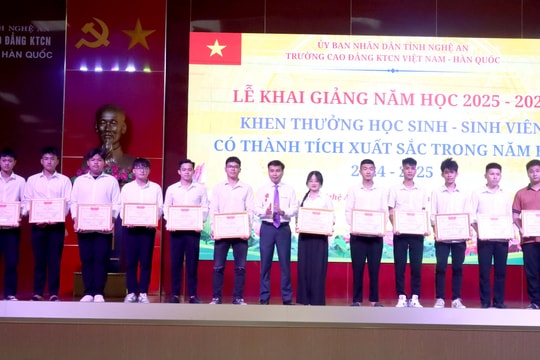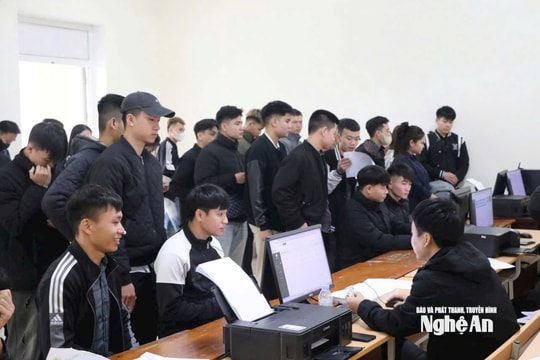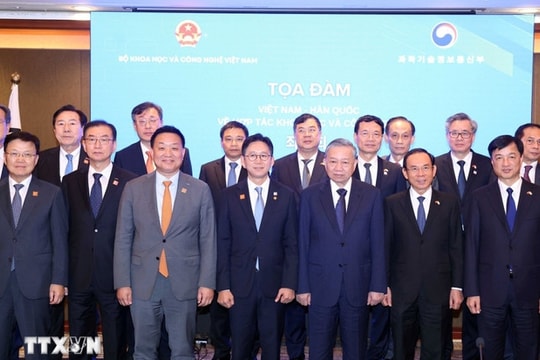President Trump pleased with gift to Washington from Korean peninsula
(Baonghean) - Following the success of his visit to North Korea with many important agreements, South Korean President Moon Jae-in continued his diplomatic efforts to "bridge" with a 4-day visit to the US. This trip of Mr. Moon Jae-in brought meaningful "gifts" to the US.
First new FTA
The first notable result of South Korean President Moon Jae-in's visit to the US this time was to bring back a free trade agreement (FTA) signed with the US after a period of difficult negotiations.
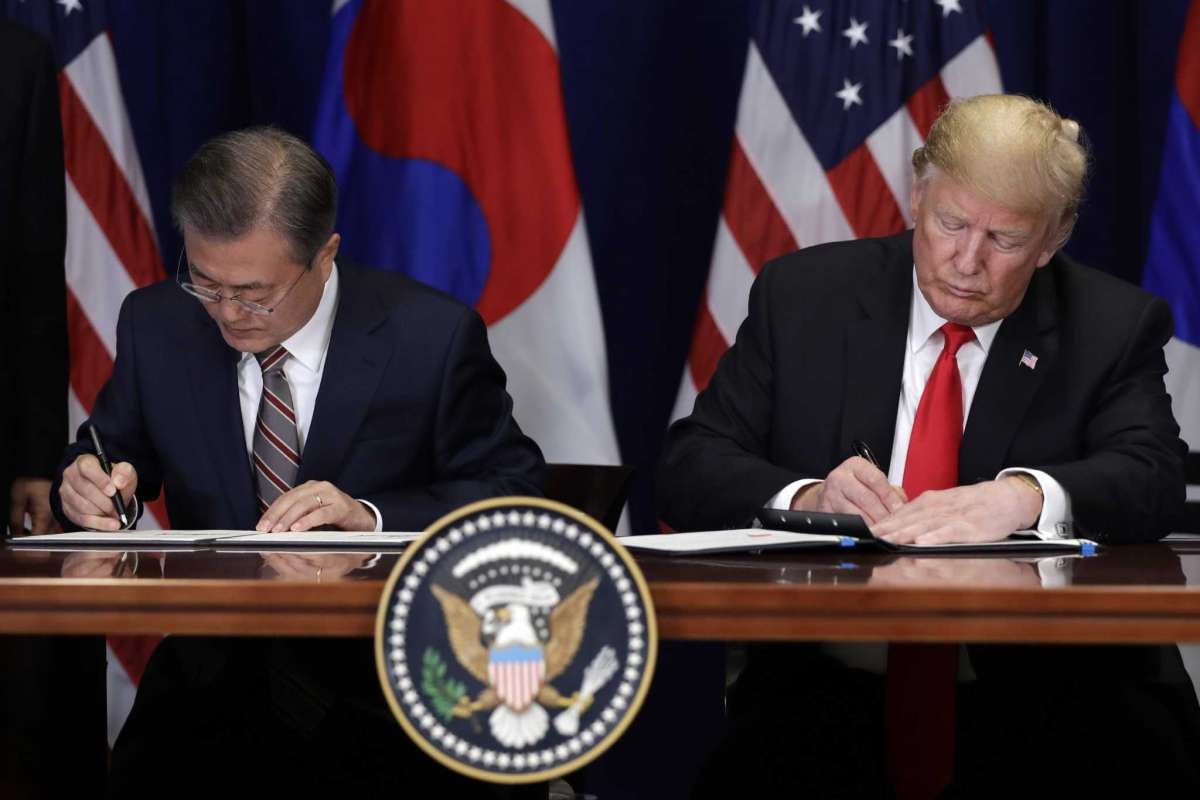 |
| South Korean President Moon Jae-in and US President Donald Trump signed a bilateral free trade agreement on September 24. AP photo |
As long-time allies, the US and South Korea have had an FTA since 2012, a symbol of deepening economic relations between the two countries.
However, this agreement fell into “danger” after President Donald Trump took office. Like many other free trade agreements, Mr. Trump called the FTA with South Korea a “job killer” and the cause of the increasing trade deficit with the US.
In an effort to reshape global trade in a more favorable direction for the US, Mr. Trump has requested to renegotiate trade agreements with several countries, including South Korea. This has made the business community of the “Land of Kimchi” restless.
Therefore, the two sides agreeing on the terms and re-signing the FTA will help Korean companies feel secure in doing business and trading under more stable conditions.
For the US, this is clearly an important “gift” from South Korea to Washington. In terms of form, this is the first time a major FTA has been signed since Mr. Trump took office.
He called this a “fair and reasonable agreement” and called it a “historic milestone” in trade. Success in re-signing the FTA with South Korea will be a “leverage” for his administration to continue pursuing a series of bilateral agreements with other countries.
In addition, with this new agreement, South Korea is said to have made many concessions in trade issues with the US.
For example, South Korea has agreed to further open its auto market to US companies in exchange for exemption from Washington's decision to raise tariffs on imported steel to 25%.
However, South Korea is still subject to an annual import quota of 2.67 million tons, equivalent to 70% of its average steel exports to the US over the past three years.
South Korea's trade concessions partly ease a thorny issue in US-South Korea relations, which have been strained since Mr. Trump took office.
The White House chief has repeatedly questioned the cost of the two countries' military alliance and criticized Seoul on trade, even as the two countries work together to address North Korea's nuclear program.
More importantly, this FTA “gift” from South Korea is also considered a factor that “pulls” the US back to the negotiating table on North Korea’s nuclear issue in a more positive way.
Pyongyang's message
In addition to the FTA, South Korean President Moon Jae-in also brought another special gift for President Trump personally: a “personal and secret” message from North Korean leader Kim Jong-un, whom Moon met last week.
This message was not disclosed in detail, but what the public can easily see is that the specific agreements announced at the recent 3rd Inter-Korean Summit were a "gift" from the South Korean President - who is acting as a bridge between the US and North Korea - to Washington.
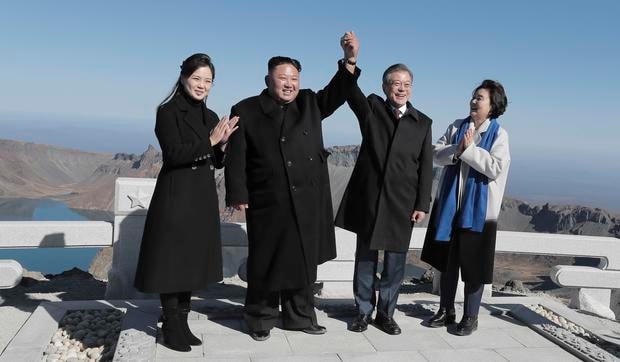 |
South Korean President Moon Jae-in and North Korean leader Kim Jong-un on top of Mount Paektu in North Korea on September 20. Getty Images. |
Specifically, at this conference, North Korea not only reaffirmed its determination to denuclearize the peninsula but also agreed to specific steps.
That is the permanent closure of the Dongchang-ri missile test site and launch site under the supervision of international experts, while Pyongyang also pledged to close all nuclear facilities in Yongbyon depending on US actions.
With such agreements, it can be said that the South Korean President has been somewhat successful in convincing Mr. Kim Jong-un to accept enough necessary concessions to resume dialogue between Washington and Pyongyang.
Therefore, in this meeting with President Trump, the message that President Moon Jae-in sent to his US counterpart was that North Korea has shown its willingness to promote denuclearization with specific steps, in line with the direction agreed upon at the US-North Korea summit in Singapore in June this year.
Therefore, Washington needs to send signals of balancing steps in response to goodwill from Pyongyang.
And the results were not beyond expectations. What Mr. Moon brought to Washington this time probably satisfied the US when President Donald Trump announced that he would soon hold a second summit with North Korea.
“Our foreign minister is making arrangements. I think the second summit will be announced soon, both the date and the location.”
It must be reiterated that narrowing the differences between the US and North Korea in implementing the denuclearization roadmap and in bilateral relations cannot be rushed overnight.
Until now, the US has insisted that North Korea must denuclearize first, while Pyongyang has demanded an early signing of a peace treaty to end the war. However, as long as both sides see the other's goodwill to resume negotiations, the opportunity to untangle the knots can open up.
It is not clear whether the second US-North Korea summit will take place in the near future as both sides intend, but clearly with Seoul's active role as a bridge, public opinion can expect the US-North Korea dialogue to continue on the right track.
If the current favorable political atmosphere remains, the second summit between President Donald Trump and North Korean leader Kim Jong-un is expected to take place before the US enters the midterm elections next November.
The domestic political situation and the balance of power in the US after this election are still unknown. Therefore, any change in the balance of power in the two houses of Congress, in the direction of the Republican Party losing control, could weaken President Trump's political strength, affecting the prospect of promoting the denuclearization process on the Korean peninsula.
Therefore, observers believe that this is the time for President Trump's administration to seriously consider and speed up the second US-North Korea summit, aiming to achieve new meaningful steps in the process of denuclearization and peace building on the Korean peninsula./.


.jpg)
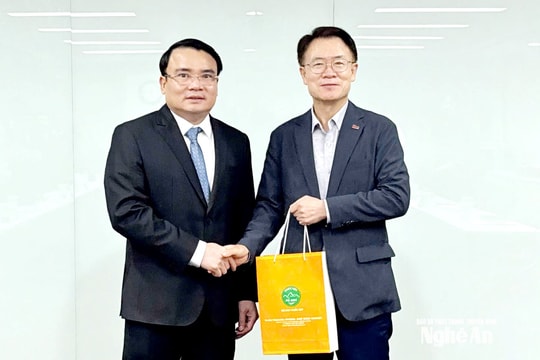
.jpg)
